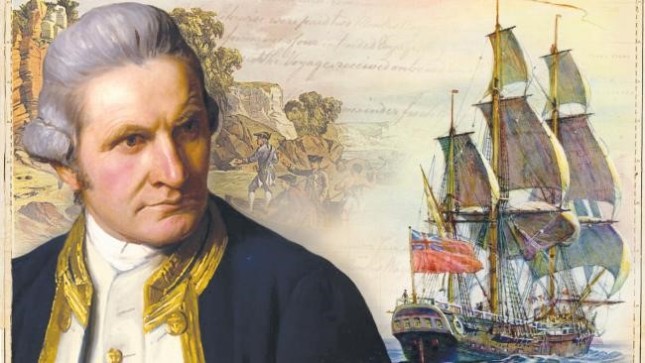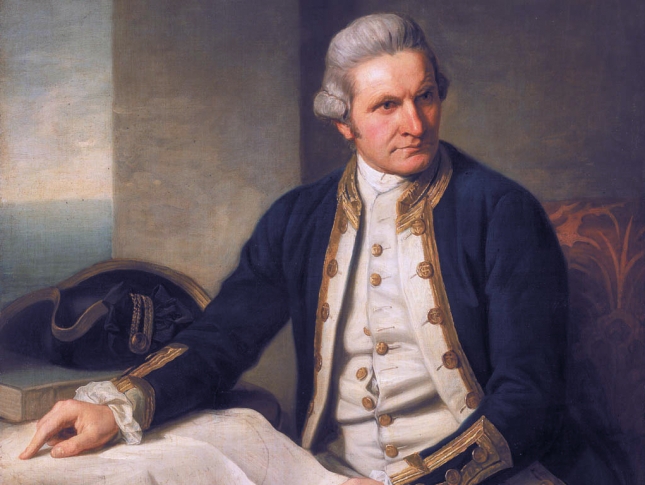
A very happy Australia Day to one and all. Technically it’s not Australia Day in Ireland yet but as the great Antipodean continent is ten hours ahead of us it’s already Australia Day in the place it matters most. Though, as it’s the small hours of the morning there the festivities probably haven’t quite kicked off yet.
As they party through their national day one wonders how much time, if any, the affable Aussies will devote to consideration of that pivotal question … who discovered them? The most frequent claimant for the honour is the English sea captain, James Cook, commander of the Royal Navy research vessel, the Endeavour. But did Captain Cook actually discover the home of the kangaroo, Kylie, and Castlemaine XXXX bitter?
Well certainly not if you subscribe to the notion, as most authorities do nowadays, that the first inhabitants of the southern continent arrived there anything up to 70,000 years ago via a short sea voyage from south east Asia or a land bridge. A natural one, not one of those interminable engineering wonders built by the Chinese. At that point in European history the Neanderthals would have been roaming this part of the world and James Cook wasn’t even a gleam in anyone’s eye. By the time Cook landed in Australia and stayed just long enough to plant a flag and claim it for Britain, the original inhabitants had spread across the land mass and spoke about two hundred and fifty languages.
And then it depends on your definition of the word ‘discover’. Even if you discount thousands of years of indigenous occupation—something at which we Europeans excel,—does a ‘float by’ count as a ‘discovery’? Because if it does, then half the ships sailing in the southern hemisphere in the 17th and 18thcenturies can probably claim to have ‘discovered’ Australia. As in …
‘What’s that off the port side, boatswain?’
‘That’s Australia, Captain.’
‘Oh, right. Looks dry. Keep heading for China so.’

In fact, in 1606, the Dutch actually landed in what is now called Queensland, made contact with local indigenous tribes and, knowing the Dutch, probably picked up all 250 aboriginal languages before they left. They even mapped large sections of the Australian coast and named the land mass New Holland. They had no idea that you could have fitted one hundred and eight six old Hollands into the new one. But one of the reasons why today’s Australian sporting teams play in yellow and green, rather than orange, is that the careless Dutch forgot to bring a flag with them so that they could plant it in the ground and claim New Holland for the Netherlands.
In fact Cook wasn’t even the first English sea captain to land in Australia. That honour went to William Dampier, an explorer who enjoyed circumnavigating the globe so much, he did it three times. He landed in Australia in 1688, almost a century after the Dutch but well before Cook, who didn’t get there until 1770. Vitally, however, Cook had remembered to bring a flag with him. He stuck it in the ground around the cove he named Botany Bay and claimed the continent for George III. His timing was excellent because just a few years later England lost one of its other useful colonies, the one about three thousand mile to the west.
So why do the inhabitants of the land of Oz celebrate Australia Day on 26 January? Well that hasn’t got a lot to do with Cook either, other than his 18thcentury equivalent of a bum steer on Trip Advisor. The 26th of January was the day the so-called First Fleet—which mostly consisted of convict ships—arrived at a sheltered cove which its commander, Commodore Arthur Phillip, chose to name Sydney, in honour of the British Home Secretary of the time. That was a couple of days after abandoning the unsuitable Botany Bay, fulsomely advertised by James Cook. His enthusiastic endorsement had drawn the fleet there in the first place. Commodore Phillip had found out the hard way that James Cook had little in common with his travel agent namesake Thomas.
Phillips had alsobrought a flag with him and planted it in the land around Sydney Cove. Obviously, after seeing Botany Bay, he was so mistrustful of Cook’s judgement that he decided the Captain of the Endeavour might even have forgotten to claim Australia for England, so he made sure there was no mistake. The Fleet brought with it the first thousand or so transported British convicts as well as 7 horses, 29 sheep, 74 pigs, 6 rabbits, 7 cattle, and probably smallpox.
So Captain James Cook and the crew of the Endeavour were not even close to ‘discovering’ Australia. It’s fake history.

You must be logged in to post a comment.